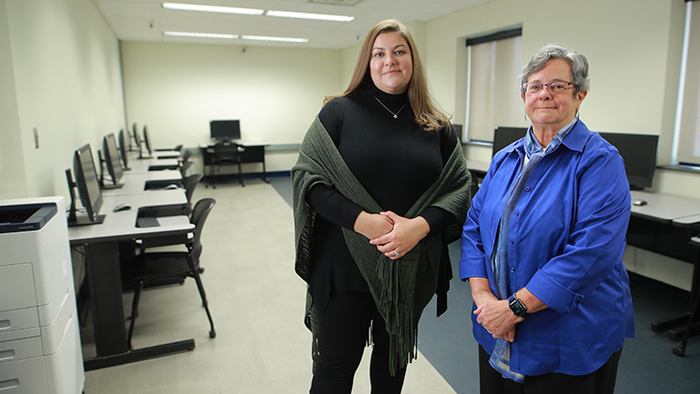From employee morale to virtual fatigue and people not using their cameras, managers navigated a wide variety of issues when thrust into leading remotely during the COVID-19 pandemic.

Credit: Daniel Miller, The University of Toledo
From employee morale to virtual fatigue and people not using their cameras, managers navigated a wide variety of issues when thrust into leading remotely during the COVID-19 pandemic.
New research from The University of Toledo conducted during the pandemic found that individuals with higher levels of emotional intelligence experienced lower levels of concern for leading remotely during the crisis.
“Prior to the global pandemic, most leaders did not have any formal training or on-the-job learning experiences related to leading remotely in a crisis situation,” said Dr. Jenell Wittmer, associate professor of management in UToledo’s John B. and Lillian E. Neff College of Business and Innovation and an industrial and organizational psychologist. “The results of our analysis confirm how effectively perceiving and managing one’s emotions contribute to effectively dealing with the challenges of leading remotely in crisis situations.”
The research demonstrates how emotional intelligence — especially the areas of self-perception and stress tolerance — can help leaders overcome their concerns about leading remotely to help them provide better communication, support, engagement and direction to employees who report directly to them.
The study titled “Leading Remotely in a Time of Crisis: Relationships with Emotional Intelligence” is published in a special issue of the Journal of Leadership and Organizational Studies that focuses on leadership through the COVID-19 pandemic.
“The COVID-19 crisis has tested even the strongest leaders, both personally and professionally,” said Dr. Margaret Hopkins, professor of management and co-author of the research. “Our study provides insights into how emotional intelligence provides a personal resource to leaders as they navigate leading remotely during a time of crisis.”
The study highlights the need for individual leaders to strengthen their emotional intelligence through activities such as self-reflection and 360-degree assessment instruments, as well as the need for organizations to invest in emotional intelligence development for their leadership teams by providing resources for training, strengthening the organization’s overall resilience.
“What leaders need especially during this type of crisis is not only a predefined response plan but more importantly behaviors and mindsets that will assist them in looking towards the future,” Hopkins said.
More than 200 people from a wide variety of industries in the Midwest participated in the study by completing two surveys, one related to leading remotely in a crisis and the second measuring their emotional intelligence.
The emotional intelligence assessment was completed for executive coaching purposes before the pandemic, between September of 2017 and March of 2020.
There are five components to emotional intelligence:
- Self-perception, which measures one’s self-awareness of emotions;
- Self-expression, or being assertive about expressing emotions appropriately;
- Interpersonal, which measures one’s ability to have effective interpersonal relationships;
- Decision-making, which measures problem-solving and reality testing; and
- Stress management, the ability to effectively handle stress.
During the pandemic, those same professionals participated in the survey about their experiences leading remotely. At the time of the survey, 82% reported that their current leadership was 100% remote, and 85% reported that COVID-19 was the first time they led remotely.
Nearly all of the participants cited transparent communication as being important during times of crisis and the general consensus about virtual meeting platforms is that they’re a “necessary evil.”
“We found that while operational issues are certainly important to address, the human elements are even more essential since the operational issues are influenced by people and their emotional reactions,” Wittmer said.
In particular, the ability to understand oneself and to manage one’s emotions, measured
by the self-perception and the stress management scales of emotional intelligence, were the two most significant components contributing to leading remotely in a crisis.
“Leaders with a high degree of self-perception will be more likely to pause before taking any
overly emotional or rash actions,” Hopkins said. “These leaders will tend to avoid being emotionally hijacked and allowing their emotions to govern their decision-making in these trying times.”
The research shows leaders with a higher degree of optimism will be more resilient in stressful times, which contributes to providing themselves and their staff with a clarity of purpose and mission.
“Crisis situations are by definition stressful times, which include strong emotions, time pressures, high stakes and ambiguity regarding solutions,” Wittmer said. “Leaders who exhibit adaptability will be more open to creative solutions as opposed to relying on their operational comfort zone.”
“There are three clear distinctions when simultaneously leading remotely and during a crisis situation: the degree of urgency, the level of uncertainty, and the presence of
strong emotions with the possibility for intense emotional reactions,” Hopkins said. “All three of these generate increased pressures on the leader and create the potential for a perfect storm.”
Journal
Journal of Leadership & Organizational Studies
DOI
10.1177/15480518211053531
Method of Research
Survey
Subject of Research
People
Article Title
Leading Remotely in a Time of Crises: Relationships with Emotional Intelligence
Article Publication Date
9-Nov-2021




